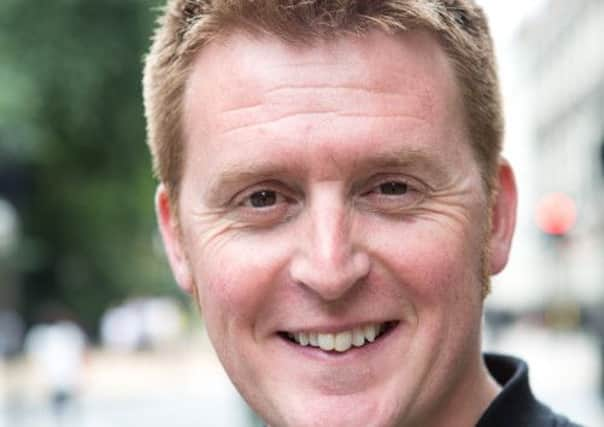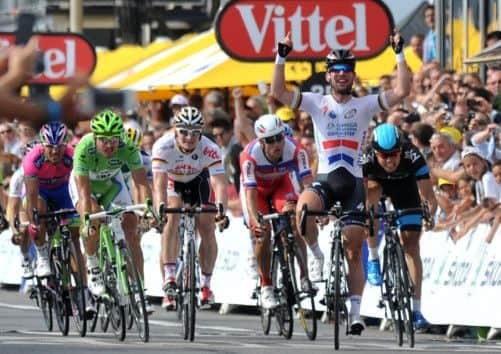Rod Ellingworth: Man at the hub of British cycling’s revolution


FIVE years ago, if you stopped someone in the street and asked them to name a British cyclist, the chances are you would have been greeted with a blank look.
Ask that question today, though, and names like Sir Bradley Wiggins, Mark Cavendish and Chris Froome readily trip off the tongue. Not to mention the likes of Sir Chris Hoy and Victoria Pendleton, whose success in the velodrome at last year’s London Olympics captured people’s imagination.
Advertisement
Hide AdAdvertisement
Hide AdThere’s nothing like a bit of success to make something popular and following last year’s Games and the heroic victories of Wiggins and Froome in the Tour de France, it seems that suddenly the country has been gripped by cycling fever.


There are now more than a million people regularly cycling in the UK, while British Cycling’s annual report, published earlier this week, revealed it had reached 80,000 members for the first time in its history.
Next year, of course, the Tour comes to Yorkshire with between two and three million visitors expected to flock here when the peleton sets off from Leeds in July.
It’s a far cry from the situation 20 years ago when cycling in this country was languishing in the doldrums. So how has this transformation come about? As GB Elite head coach and Team Sky’s performance manager, Rod Ellingworth is one of the chief architects behind this success and he charts this rise to dominance in a new book – Project Rainbow – How British Cycling Reached the Top of the World – co-written with journalist William Fotheringham.
Advertisement
Hide AdAdvertisement
Hide AdHe will be talking about this sporting success when he appears at the Morley and Ilkley Literature festivals this weekend. Ellingworth, himself a former professional cyclist, says the big game changer was the introduction of National Lottery money back in 1997.
“Without that we wouldn’t have anything because it gave us a base and since then we’ve slowly built on that,” he says. “You began to see the difference in terms of opportunities and facilities. There was a much better structure in place and we started getting professional people involved.”
He says the creation of Team Sky in 2008 (which he helped set up) was another pivotal moment. “Before then it was all about the Olympics every four years. We’d have a hit with the world championships and pick up a few medals, but it’s really been in the last four years where everything’s really accelerated with the success of the last two Tours and having a home Games.”
Ellingworth, who represented Britain for more than a decade in professional competitions, says the sport has come a long way from when he was growing up in the early 80s. “My dad and his family were into cycling and we were involved in local clubs and putting on races, so it was always part of our lives.”
Advertisement
Hide AdAdvertisement
Hide AdNot that there were many role models at the time. “My hero when I was growing up was Sean Kelly, he was a big British rider, but he seemed a million miles from what we were doing and making the next big step always seemed a long way off,” he says.
When people talk about great cycling nations they perhaps think of Spain or the Netherlands or, not necessarily the UK.
“Cycling used to be fairly big here. If you go back to the Second World War and the postwar period then a lot of people cycled, it was an easy way to get around and it was something to do at weekends.
“But then it started to die off a little in the 70s. People had other things to do, particularly kids, and it’s still an important question today, how do you capture the imagination of 14 and 15 year-olds?”
Advertisement
Hide AdAdvertisement
Hide AdOne way is by winning two Tours on the trot and a sackful of medals at the Olympics and he agrees that it’s been a “phenomenal” couple of years for the sport. “We’re perhaps not up there with football and rugby but there’s definitely more interest and cycling is a lot more mainstream. If you speak to people now they know about Bradley Wiggins and Mark Cavendish, they’ve become household names.”
The triumphs of Britain’s cycling elite in the last few years has had a knock-on effect. “Anybody who has anything to do with the cycling industry is doing better than they were before.” While the fact that many more people are getting on their bikes brings other, simpler benefits. “It’s a good way of getting fitter physically and being outdoors goes hand in hand with a healthy lifestyle.”
He believes this cycling renaissance is here to last. “Just look at the crowds for the Tour of Britain and the RideLondon event, thousands of people came out to watch.”
And he’s expecting next year’s Grand Départ to be another huge occasion and keep the bandwagon moving. “Yorkshire has such a strong cycling tradition and it’s always had big races, so the fact the Grand Départ is coming to the region is great, not just for Yorkshire but the whole country. The roads and the terrain there lend themselves perfectly to cycling and it will be a great event.”
Advertisement
Hide AdAdvertisement
Hide AdLooking back he says the Olympics were a “life-changing” moment for many people. “We had a lot of success in the velodrome and even though we didn’t succeed in the road races to the same extent, those who took part will never forget it. Mark Cavendish didn’t win but he’ll look back on it as a pleasurable experience.”
But he was surprised by just how popular the London Games were. “It was bigger than I ever thought it would be. The crowds were bigger and I didn’t come across anyone who didn’t watch it or weren’t talking about it. It made people proud to be British.”
There was a lot of talk after the Olympics about the importance of creating a lasting legacy and with more people now getting on their bikes the Government earlier this year pledged £77m towards improving cycling routes in Leeds and seven other cities around the country.
West Yorkshire will be one of the chief beneficiaries receiving £18.1m from the Department of Transport, along with an additional £11.2m from local councils, to create new cycling schemes - including a cycling superhighway from Leeds to Bradford and new connections in Leeds city centre, along with an upgrade of the Leeds-Liverpool towpath.
Advertisement
Hide AdAdvertisement
Hide AdIt’s a tangible benefit linked to the feelgood factor that Britain’s top cyclists helped to create. But can the success enjoyed by British cycling be replicated in other under-performing sports, like swimming, for instance?
“One of the reasons I did the book was to look at whether there was some kind of blueprint that other sports might be able to follow. I think there is, but at the same time if you don’t have the right characters in place then the blueprint isn’t going to work.
“There’s no reason why it can’t be done, but you have to get the right people involved – that’s the most important thing.”
Rod Ellingworth is talking at the Morley Literature Festival tomorrow. Tickets are available online at www.morleyliteraturefestival.co.uk or by calling 0844 848 2706. He is also appearing at the Ilkley Literature Festival on October 13. For more information call the box office on (01943) 816 714 or visit www.ilkleyliteraturefestival.org.uk
Advertisement
Hide AdAdvertisement
Hide AdProject Rainbow – How British Cycling Reached the Top of the World, is published by Faber & Faber, on October 17, priced £18.99.
The wheels of Britain’s cycling revolution in motion
According to British Cycling, the sport’s governing body, 2012 was a “bumper” year with success among elite riders, including a second British winner of the Tour de France, that has also boosted progress at a grassroots level.
British Cycling now has 80,000 members for the first time in its history, a 40 per cent increase on the previous year’s figure.
The organisation – alongside Sport England and its main partner Sky – has also hit its target, one year ahead of schedule, of getting one million people to cycle regularly.
Advertisement
Hide AdAdvertisement
Hide AdBritain now has world champions in track cycling, BMX and mountain bike downhill racing.
A new strategy has been launched get one million more women cycling by 2020.
More than 100,000 young people have been given the chance to take part in British Cycling’s youth development programme, Go-Ride.
Next year’s Grand Départ, which starts in Leeds, is expected to attract up to three million people to Yorkshire.